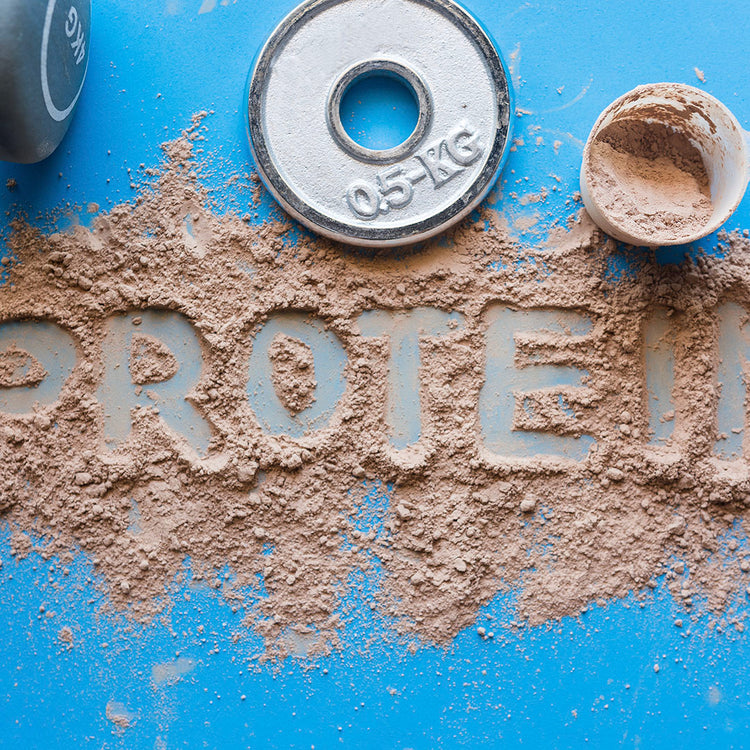
TLDR: Plant-based protein isn’t *just* for vegans
Protein powder is a supplement that can find its way into your life in a myriad of ways, from traditional protein-boosted smoothies and drinks to baked goods like muffins and cookies given a proteinous makeover with the addition of some powder.
When shopping for protein, whether it be online or in-store, you’ll likely run notice two main options: whey protein and plant-based protein. This dichotomy may make your decision seem obvious — plant-based is for vegans and whey is for everyone else — but the truth is, the choice really shouldn’t be that clear-cut.
In the realm of protein powders, whey was virtually the only option for many years. It’s cheap, readily available and has been scientifically found to be a complete protein which can help build muscle, but there are downsides to the product.
- It’s heavily processed — These days, folks are pretty informed that processed food is bad news and can even sabotage your health (and muscle-building) efforts. The processing of whey-based protein powders has proven to decrease its nutritional value and has even been found to add harmful metals into the mix.
- Artificial sweetener use is real (and TBH, you can probably taste it) — We’re not going to say that artificial sweeteners are your biggest enemy, but in 2020 we know better than to consume these additives. These (often chemical-ridden) sweetners have been studied quite a bit and found to enhance appetite, increasing cravings, binging, and feelings of withdrawal.
- Digestive issues — Eating too much whey protein can cause digestive issues such as nausea, flatulence, diarrhea, pain and cramping. It all stems from the known digestive disruptor, lactose which is found in whey. (Fun Fact: Most folks are actually intolerant to dairy, which complicates the digestion process, causing all sorts of stomach upset including … farts). If you want to dive into an internet hole about “protein farts” Reddit has your back here, but it’s a real issue that has been well-reported by the likes of Men’s Health and Shape magazine.
If these whey protein fast-facts have you rethinking your current protein choices, let us introduce plant-based protein — which, believe it or not, is not just for vegans. These dairy-/whey-free protein blends merit use by men, women, vegans, non-vegans and beyond.
First thing’s first, you may be wondering what the heck plant-based protein is made out of. The truth is, that it can actually be made out of a number of bases including: pea, hemp, rice and soy proteins — though a blend of brown rice and pea proteins are found to be the most impactful, as they cover all of the amino acids necessary for muscle growth and recovery.
So, what are some reasons to switch to plant-based protein powder? Here’s the scoop:
- They’re way easier to digest — It’s just a fact that plant matter is far easier to digest than say, cheese and other dairy products. In fact, hemp is thought to be the most digestible protein source for humans because it contains a unique blend of two soft, highly digestible proteins dubbed edestin and albumin.
- They’re much less processed — Plant-based protein sources typically require very little processing and are often naturally equipped with amino acids. Even the plant-based options that aren’t complete with amino acids require far less processing than a comparable container of whey protein. Like we said before, the less processed food you consume, the better.
- They’re extremely nutrient dense — So, nutrient density refers to the amount of beneficial nutrients — vitamins, minerals, complex carbohydrates, lean protein, and healthy fats — in a food product. Some of the most nutrient-dense foods, you ask? Fruits, veggies, whole grains, and legumes. To wit, plant-based protein sources are known to further nutritional goodness beyond protein alone, unlike whey.
These benefits are compounded by the fact that plant-based protein powders are actually quite comparable to their whey counterparts. A 2019 study concluded that “whey and pea proteins promote similar strength, performance, body composition, and muscular adaptations” after following the weightlifting feats of two groups — one that consumed whey; one that consumed pea protein — over an eight-week period. Further, a clinical study from 2013 found that brown rice protein was equal to whey protein when it came to; building muscle, gaining strength, and aiding in recovery.
It’s worth noting that while these studies focused on one form of plant-based protein compared to whey, experts actually believe that a protein powder featuring a blend of plant-based sources (i.e. hemp, pea, and brown rice, for example) are the most beneficial. These protein blends — like LivWell Nutrition — are thought to provide the well-rounded, high-quantity amino acid profile needed to promote health and gain muscle.
If you’re sold on the benefits of plant-based protein we’d, of course, love if you consider checking out LivWell’s lineup of spectacular organic plant-based protein powders which, BTW, are free from soy, gluten, GMOs and dairy. Shop our protein collection here.


Be the first to comment